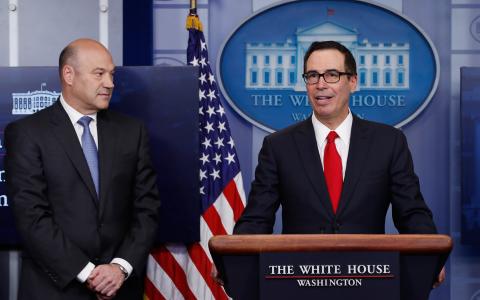
Treasury Secretary Steven Mnuchin brushed aside signs that investors are nervous about rising prices and criticism that growing debt will harm U.S. economic security, declaring that President Donald Trump’s policies won’t cause inflation.
“There are a lot of ways to have the economy grow,” Mnuchin said in an interview aboard a train to Philadelphia on Thursday, where he toured the U.S. Mint. “You can have wage inflation and not necessarily have inflation concerns in general.”
He also said he isn’t concerned about foreign investment in new U.S. debt, which analysts expect will exceed $1 trillion this year.
An unexpectedly large jump in average hourly earnings in January set off a stock market swoon as investors worried about higher inflation and interest rates. In addition, long-term Treasury yields have surged in recent weeks, in part driven by concerns that widening budget deficits under the Trump administration will fuel inflation.
As Trump’s chief economic cheerleader, Mnuchin has consistently deflected any suggestion that the president’s policies could have a downside. He sidestepped the idea that tax cuts and increased federal spending Trump has signed into law amount to an economic stimulus.
“Is it very good for the economy? Absolutely,” Mnuchin said of the tax cuts. “One of the reasons why the president won the election is because most middle-class Americans had very little wage growth.”
Jeffrey Gundlach, the chief investment officer at Los Angeles-based DoubleLine Capital LP, expressed skepticism about the Treasury secretary’s assessment.
“Mnuchin: policies will raise wages w/out inflation. Yeah, sure,” the billionaire bond manager wrote on Twitter Thursday evening. “If by miracle wages go up w/out inflation not good for profits. If wages go up w/ inflation not good for bond yields, ergo P/E ratios. Hmmm,” he wrote in a second tweet.
Foreign Investors
Much of the new U.S. debt will be bought by foreign investors. Foreign holdings of U.S. Treasuries stood at $6.3 trillion as of the end of last year, hovering near a record amount and almost double the level when the recession ended in 2009. China alone holds about a fifth of foreign-held debt, making it the U.S.’s largest creditor.
The director of national intelligence, Dan Coats, told the Senate Intelligence Committee on Feb. 13 that the U.S. debt, now at $20.8 trillion, is “unsustainable” and “represents a dire threat to our economic and national security.”
“I would urge all of us to recognize the need to address this challenge and to take action as soon as possible before a fiscal crisis occurs that truly undermines our ability to ensure our national security,” Coats said.
But Mnuchin said that foreign investors in U.S. debt don’t worry him.
“I’m not concerned about that for national security risks,” he said, adding that what’s important is that the U.S. can afford to finance its military and intelligence operations.
Energy Independence
Mnuchin’s remarks on the tax cuts reflect the administration’s public argument for them. Kevin Hassett, chairman of the White House Council of Economic Advisers, has said that the tax law signed in December will help bolster productivity gains by encouraging companies to invest in efficiency-enhancing equipment, allowing the economy to grow faster without spurring inflation.
The Treasury secretary also suggested that the U.S. is less vulnerable to oil-driven inflation because of rising energy production in the country.
“We’re no longer fully dependent on foreign oil,” Mnuchin said. “Energy is always a big concern in terms of inflation, among the geopolitical risks.”
After ebbing in 2017, inflation recently picked up. Consumer prices in January were 2.1 percent higher than a year earlier, up from 1.6 percent in June. Wages also are rising. Average hourly earnings rose 2.9 percent in January from a year earlier, the fastest pace since the recession ended in June 2009. With unemployment at its lowest level since 2000, companies increasingly must pay more to hire and retain the workers they need.
The big question, still unanswered, is whether businesses will raise prices to cover the added labor costs.
Some companies are suggesting labor costs aren’t their main challenge. Wage inflation expected in the range of 2 percent to 3 percent for workers in the metals industry this year is “not a big issue for us,” Century Aluminum Co. Chief Executive Officer Mike Bless said in an interview with Bloomberg Television on Friday. Electric power expenses and the market prices of aluminum are far bigger considerations, Bless said.



